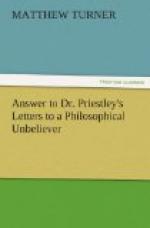Still every thing is as God intended it—so asserts Dr. Priestley; and therefore it cannot by him be denied that crimes and vices, are of his intention. The Theist exclaims in triumph, “He that made the eye, must he not see?” But who made the eye? Or grant that God made the eye, which can only see in the light, must he necessarily see in the dark? It is again asserted, “the power which formed an eye had something in view as certainly as he that constructed a telescope. If any Being formed any eye, grant it. But if the eye exists necessarily as a part of nature; as much as any other matter, or combination of matter, necessarily existed, the result of the argument is intirely different.
It is far from being a necessary part of the atheist’s creed to exclude design from the universe. He places that design in the energy of nature, which Dr. Priestley gives to some other extraneous Being. It is rather inconsistent also in him to say, that an atheist rightly judging of his own situation upon his own principles, ought not to hold himself quite secure from a future state of responsibility and existences, and yet to say he must in his own ideas hold himself soon to be excluded for ever from life.
As to the immutability of the Deity, it is difficult to guess how that is proved, except by the argument of Lucus a non lucendo, because every thing is changing here; therefore the Deity never changes; which is neither an argument a priori nor posteriore, but sui generis, merely applicable to the Deity.
From the imperial infinite intelligence of the Deity an argument is formed of his unity. Dr. Priestley says, “that two infinite intelligent Beings would coincide, and therefore that there can only be one such Being.” Two parallels will never coincide. That is one of the first axioms of Euclid, in whom Dr. Priestley believes as much as in his bible. If the Beings are infinite in extent and magnitude they must certainly coincide, but if they are only infinite in intelligence, it does not seem to be necessary that they should.




